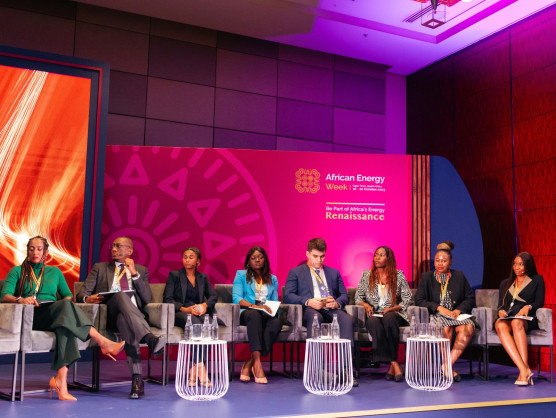A Technical Track hosted by pan-African legal and business advisory group, Centurion Law Group, held during the 2023 edition of African Energy Week (AEW) (www.AECWeek.com) – taking place in Cape Town from 16-20 October – explored the legal, regulatory, and tax frameworks throughout Africa.
The technical track kicked off with opening remarks by Centurion Law Group Managing Director and Partner, Zion Adeoye, who moderated the session and spoke on Africa’s position as one of the world’s most attractive destinations for investment and how legal and regulatory frameworks are being put in place to advance local content development in the continent’s energy sector.
“Africa remains one of the most attractive destinations for investment,” Adeoye stated, adding, “It is very clear that for the next two to three decades, oil and gas development will be very active. In Africa, local content manifests in several ways – shareholding in the company and utilizing local manpower. In the extractives industry, investors always have the problem of balancing the best hands to work on their projects and adhering to local content laws in terms of getting the right content barriers across the industry.”
Following the presentation, a panel featuring the participation of international legal representatives from Mauritius, South Africa, Equatorial Guinea, Guinea, Russia, South Sudan, Ghana, and Nigeria explored the regulatory and legal frameworks throughout the continent and abroad.
“In Mauritius, we allow investors to engage in transactions more easily in Africa,” stated Keseena Chengadu, Head of Investment at Centurion Law Group, adding, “It’s good to use us as a hub when internationals want to invest in Africa. We offer assistance to internationals with engaging in transactions, which can be very challenging.”
“South Africa is comparatively significantly industrialized, and it results in a few advantages for potential investors,” stated Gari Matarirano, Energy and Infrastructure Attorney at Centurion Law Group, when speaking on the southern African country, adding, “First off, the reliability of professional service firms, the tax system, is quite sophisticated with a strong source of funding through the financial system.”
“In Ghana, we have a robust regulatory framework,” stated Yorm Ama Abledu, Senior International Attorney at Centurion Law Group, adding, “As lawyers, we are able to guide clients and allow them to speak with the right authorities to deal with so that they are compliant with the law.”
The speakers spoke on local content development laws in Africa, highlighting the benefits and challenges related to investing in the continent while adhering to specific laws that could require as much as between 25% and 40% local participation.
“The markets are not very saturated, but the population is constantly growing, so it’s a nice place to invest. But the fear of an investor is that they have to give up an average localization percentage of 25%,” stated Alexey Khromov, Law Intern at Centurion Law Group, adding however that, “The Government should think in the best interest of the communities, but also think about how to make your country more attractive as an investment destination.”
“In South Sudan, the country has given opportunities for foreign investors in terms of employment, but our investment promotion and requirement laws required 80% national workers in any company engaging in the country,” stated Rachel Tanda, Attorney at Centurion Law Group.
Additionally, Tamara Jombai, Attorney at Centurion Law Group touched on the individual requirements for companies seeking to participate in African markets, stating that, “When you are coming into a country, you need to decide on the size of the company and the kind of project you will be doing, which will determine what you will do.”
Furthermore, it was noted during the panel discussion that African countries feature diverse and robust taxation agreements, with Mauritius boasting 46 double taxation agreements across the world, which serves to help entities do business throughout the continent while using Mauritius as a hub. Meanwhile, the determination of doing business in South Africa is made in accordance with common law principles, wherein a foreign company engaging in the southern African country is subject to codified rules for certain types of income such as dividends, royalties, and interest.
Speaking on South Sudan’s tax regulations, Grace Yella, Director for the Economic and Monetary Community of Central Africa at Centurion Law Group stated that, “There is a wide range of options for investors to settle business in the East African region. Each country has particularities when it comes to tax. The similarity is they opt for each investor to have the possibility to have their own declaration – they choose what to pay as tax. The authorities then have to carry out investigations to confirm that what has been submitted correlates to your commitments.”
The panel closed off by noting that Africa is diverse in its legislation and regulatory requirements, highlighting that international investors seeking to do business in the continent are subject to a variety of frameworks. With a burgeoning energy sector and fast-growing population, the panelists noted that Africa’s growing industries and economies will continue to serve as a promising investment destination for international firms.
Under a mandate to make energy poverty history by 2030, AEW 2023 kicks off its strategic program on 17 October, and will unite African energy policymakers and stakeholders with global investors to discuss and maximize opportunities within the continent’s entire energy sector.
Distributed by APO Group on behalf of African Energy Week (AEW).

